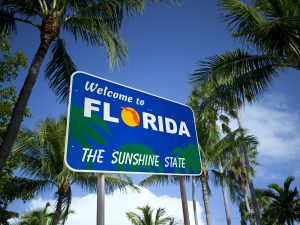 Hub City Enterprises Inc. and Wall St. Enterprises of Orlando Inc. ran an event called “Rum Fest 2017” in Orlando, Fla. Sounds like fun, doesn’t it? But one of the partygoers, who apparently paid to attend the festival, was not amused. In the middle of the party, Robert Hunt saw an oversized beach ball barreling towards his head. When he reached out to deflect the projectile, he ended up suffering injuries to the ligaments in his arms. Mr. Hunt sued Hub City and Wall St. Enterprises, who tendered the claim to Princeton Excess and Surplus Lines Insurance Co., their liability carrier, for a defense. Princeton initially assumed defense of the claim, but it soon repaired to federal court seeking a declaration that it had no duty to defend the suit. In Princeton Excess & Surplus Lines Ins. Co. v. Hub City Enterprises, Inc., the Southern District of Florida ruled in favor of the insurer.
Hub City Enterprises Inc. and Wall St. Enterprises of Orlando Inc. ran an event called “Rum Fest 2017” in Orlando, Fla. Sounds like fun, doesn’t it? But one of the partygoers, who apparently paid to attend the festival, was not amused. In the middle of the party, Robert Hunt saw an oversized beach ball barreling towards his head. When he reached out to deflect the projectile, he ended up suffering injuries to the ligaments in his arms. Mr. Hunt sued Hub City and Wall St. Enterprises, who tendered the claim to Princeton Excess and Surplus Lines Insurance Co., their liability carrier, for a defense. Princeton initially assumed defense of the claim, but it soon repaired to federal court seeking a declaration that it had no duty to defend the suit. In Princeton Excess & Surplus Lines Ins. Co. v. Hub City Enterprises, Inc., the Southern District of Florida ruled in favor of the insurer.
Articles Posted in Florida
Insurer Cannot Avoid Duty to Defend Defunct Insured
 A recent decision in the Middle District of Florida, Southern Owners Insurance Company v. Gallo Building Services, Inc., reminds us of the high bar an insurer must clear to avoid its duty to defend an insured—even when that insured is out of business.
A recent decision in the Middle District of Florida, Southern Owners Insurance Company v. Gallo Building Services, Inc., reminds us of the high bar an insurer must clear to avoid its duty to defend an insured—even when that insured is out of business.
Florida’s Construction Defect Resolution Process Is a “Suit” that May Require Insurers to Defend Construction Professionals
Any construction professional working in Florida likely is familiar with the state’s notice and opportunity to repair statute (“chapter 558”) that creates a process for trying to resolve construction defect claims without litigation. As the first step in this mandatory process, a property owner must serve a chapter 558 notice on the construction professional, which notice describes the alleged defects and damages.  Many construction professionals submit chapter 558 notices to their general liability insurers and request a defense. But it has always been an open question whether the chapter 558 process is a “suit” triggering an insurer’s duty to defend—until now. In Altman Contractors, Inc. v. Crum & Forster Specialty Insurance Company, the Florida Supreme Court decided that the chapter 558 process is a “suit” but left open the possibility that the process is only a “suit” when an insurer says it is. In a per curiam opinion in the original federal case, the U.S. Court of Appeals for the Eleventh Circuit relied on the Florida Supreme Court’s opinion to vacate the district court decision holding that the chapter 558 process is not a “suit” and remanded the case for further proceedings.
Many construction professionals submit chapter 558 notices to their general liability insurers and request a defense. But it has always been an open question whether the chapter 558 process is a “suit” triggering an insurer’s duty to defend—until now. In Altman Contractors, Inc. v. Crum & Forster Specialty Insurance Company, the Florida Supreme Court decided that the chapter 558 process is a “suit” but left open the possibility that the process is only a “suit” when an insurer says it is. In a per curiam opinion in the original federal case, the U.S. Court of Appeals for the Eleventh Circuit relied on the Florida Supreme Court’s opinion to vacate the district court decision holding that the chapter 558 process is not a “suit” and remanded the case for further proceedings.
Florida, Sebo and the Concurrent Causation Doctrine

The Florida Supreme Court recently issued a widely reported decision, Sebo v. American Home Assurance Co., which applied the concurrent cause doctrine in ruling that an all-risk homeowner’s insurance policy provides coverage when damage is the result of multiple events—so long as at least one of them is a covered peril. Plaintiff John Sebo purchased a home, which he insured under an all-risk homeowner’s policy written by American Home. As an “all-risk” policy, it provided coverage for damage to property caused by all perils, except those it explicitly excluded. Design defects and faulty construction were among the excluded perils. Within less than two months of buying the house, Mr. Sebo discovered major leaks during rainstorms, which were later found to be the result of design defects and faulty construction. Hurricane Wilma then caused even more damage. When Mr. Sebo sought coverage for damage from the water intrusion, American Home denied most of the claim on the grounds that it was caused by design defects and faulty construction—which were excluded perils. But the Florida Supreme Court found coverage.
Insurers Beware: Florida Courts May Award Attorney’s Fees for Any Incorrect Denial of Coverage

Florida is a hotbed for insurance claims, from run-of-the mill auto accidents to pervasive construction defects to post-hurricane business interruptions, and everything in between. Insurance companies are likely to deny many of those claims—whether or not that denial is proper—hoping that their policyholders will be unwilling to spend the time and money required to demonstrate coverage. But with its new decision in Johnson v. Omega Insurance Company, the Florida Supreme Court reminds policyholders that they have a powerful tool against improper denials of coverage—the awarding of attorney’s fees. Continue Reading ›
Florida Appeals Court Overturns Notice/Prejudice Ruling Against Policyholder
Florida’s Third District Court of Appeals recently held that whether “prompt” notice was given to an insurer of a claim occurring over three and a half years after a hurricane caused damages to a condominium is a question of fact that must be given to the jury. This ruling confirms that the date on which an insureds’ duty to report a claim is triggered under an insurance policy’s notice provision is an issue of fact not ripe for summary judgment. The case is Laquer v. Citizens Property Insurance Corporation.
 Policyholder Pulse
Policyholder Pulse


